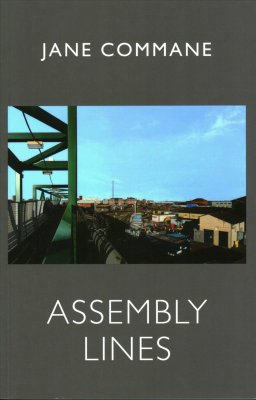REVIEW: JANE COMMANE’S ‘ASSEMBLY LINES’
ASSEMBLY LINES BY JANE COMMANE
BLOODAXE BOOKS
ISBN: 978-1780374086
£9.95/64 pages
Reviewed by Stella Backhouse

“Sexual intercourse” declared Philp Larkin in his second-most-celebrated opening line “began/ in nineteen sixty three”. Published four years later, at the height of the Summer of Love (and three hundred years after John Dryden’s poem of the same name), Larkin’s “between the end of the Chatterley ban/ and the Beatles’ first LP” heralds a vibrant Britain on the cusp of cultural revolution. Fast forward to 2018, and decades of stagnation mean the kneejerk response to fellow-Coventrian Jane Commane’s “between glasnost and things can only get better” is a bitterly chuckled “Wanna bet?”
Assembly Lines, Commane’s subtle, complex début collection, explores the impact of growing up in an era of decline, and the ambiguity of emotional attachment to its landscapes. To vistas that are “nondescript”, “forgettable” and like “Morris, Austins and Talbots, slightly crap, even when new”, she brings an appreciation more traditionally applied to the natural world, together with a determination to stay clear-eyed about what it really means.
This is not a trivial endeavour. The line dividing emotional attachment from nostalgia is already a thin one. The politicisation of nostalgia since the Brexit vote has left the past as artistic source material ever more vulnerable to misinterpretation. In ‘Our Old Lady of the Rain’, Commane confesses of a derelict former factory “I loved her, though I didn’t know if I should”. What is her reservation? Could it be guilt that love is not an appropriate response to a place where futility seems to be the ultimate memorial to working lives spent within its confines.
The poems in Assembly Lines were written on either side of the EU referendum, and there is a sense that the outcome blew Commane off course somewhat. Not just because afterwards, the past became even more heavily-contested terrain than it was before; but also because Commane herself is clearly a remainer, while the post-industrial town of Rugby, the inspiration for many of the poems, was, like many other so-called ‘left-behind’ areas, enthusiastic for leave. Post-referendum, she faces the dilemma of how to love a town but hate the way it voted.
The most direct confrontation occurs in the five stanzas of ‘UnWeather’, the Brexit-inspired poem that sits at the heart of the collection. In the searing, shocking fourth stanza, Commane voices the pulsing rant (or are they the silent thoughts?) of a xenophobic leaver who wants “to piss a stream of Rule Britannia over their flowerbeds”.
But it is Stanza II that is perhaps the most significant, with its repeated chant that “we need a new word” for emotions such as “the sense of betrayal/that smashes the pedestals of household gods”. Loudmouthed haters are easy: they deserve to be taken down. Far more problematic are the rank-and-file, the leavers-next-door, the people who feed your cat when you go on holiday. How do you talk about the choice they made without deepening divisions?
For answers, Commane turns to structural factors such as inequality, the revisionist nature of the National Curriculum and the shallowness of the service economy (“vast retail shacks/hitched up on borrowed cash”). She also approaches obliquely, as in the heartbreaking nature poem ‘Disturbed’ or the ‘On the New Bypass’ where “the vanishing point of the bypass bisects and turns in on itself”. Her fascination with maps suggests both connection to older landscapes and present-day loss of direction. What is left curiously under-examined is the alienation of feeling that the place that forged your identity no longer identifies with you.
Assembly
Lines touches
on the inseparable entanglement of the Brexit vote with the sensitive areas of
time, place, memory and identity. But at a time when we desperately need to
look forwards, it also exposes the extent to which the difficulty of speaking
about Brexit, created in part by these issues, is impacting artistic
expression: how can we envision the future if we cannot articulate the
here-and-now? Jane Commane is right: we need new words.
